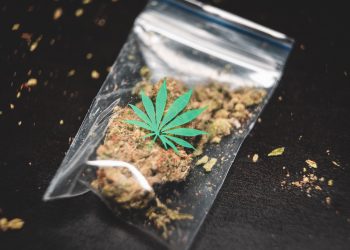Before using CBD, you should try to familiarize yourself as much as possible with the compound and its effects. Unfortunately, there’s a lot of conflicting information online about CBD, leading to confusion.
Here at Premium Jane, we aim to educate our readers with the truth; we never make any claims that aren’t backed up by research.
If you have questions about cannabidiol, such as ‘how long does CBD stay in your system?’, then we’re here to answer them today. We will be explaining the ins and outs of CBD and drug testing. Hopefully, by the end, you’ll no longer have to worry about asking, ‘how long does CBD oil last in your system?’ again.
First off, it’s worth noting that the 2018 Farm Bill removed cannabidiol from the controlled substances list. As such, employers should not be testing for the use of CBD oil. The law changes depending on where you live, but most states now allow the use of low-THC CBD oil. As a result, you don’t need to fret too much over how long CBD stays in your system. Still, it can be useful information to know.
How Long Does CBD Last?
Contents

So, how long does CBD oil last? Of course, several individual factors will affect how long CBD stays in your system. For example, your metabolism, body size, and how much CBD you used. Cannabinoids can also accumulate, meaning that if you take CBD every day, then its metabolites will be in the body for much longer.
Typically, CBD will remain in your body for 2-5 days. Regular users could have CBD in their systems for a few weeks. As we already mentioned, the length of time CBD stays in your system is quite dependent on biological factors, so you can’t do much about it.
But did you know that the timespan is also affected by the foods you eat? Taking CBD alongside fatty foods will mean that it stays in your body for longer. Using CBD on an empty stomach can reduce the time it spends in your body because it is not slowed down as much in the digestive system.
It’s likely that you’re reading this article because you go through employee drug testing at work. If that’s the case, then the following sections are for you. Stick around while we explain whether CBD will show up in a drug test. Before we do, though, you should read up on the CBD laws in your state. If you happen to live in one of the few states that are strict on CBD, then it might be best to avoid it altogether.
Does CBD Show up in Blood Tests?
Technically, CBD does show up in a blood test. Scientists have actually conducted several studies on CBD in the blood, and results show that the compound is detectable shortly after using it. To be honest, this is to be expected with any cannabinoid.
In a study from 2005, researchers gave the volunteers 2.5mg of THC and 1.35mg of CBD in the form of a capsule. They detected CBD in the blood of the volunteers for up to 6 hours after use, but not after that.
An earlier study from 1991, published in Pharmacology Biochemistry and Behavior, looked at CBD levels in the blood over a more extended period. Patients were given 700mg of CBD per day for six weeks. The researchers found that, one week after the dosing had stopped, concentrations of CBD in the blood were just 1.5 nanograms per milliliter, making it virtually undetectable.
It’s unlikely that you’ll ever be asked to do a CBD blood test. Since CBD does not cause impairment, it would be a bit pointless to test people for recent CBD use. Whether it be employers or police carrying out the test, you are not likely to have to give blood.
How Long is CBD Detectable in Urine?
Urine tests, sometimes called a urinalysis, are the most common type of drug test carried out by employers. They are cheap and accurate, and they can detect most drugs. A urinalysis can tell your employer that you have been using cannabis. However, they’re not testing for CBD.
A urinalysis detects amounts of THC-COOH in your system. This compound is a THC metabolite, meaning it is produced when THC breaks down in the body. Employers are testing for THC because it’s the compound that causes the high associated with cannabis, and therefore it can cause impairment if used at work. THC is also illegal on a federal level and in many states.
Although CBD also breaks down into metabolites, it’s not a concern for employers or law enforcement. As a result, urine tests don’t really check for it. There’s not really such thing as a CBD oil urine test, so you don’t have to worry about failing it.
That being said, although there’s no CBD urine test, using CBD could cause you to fail a urinalysis. When using full-spectrum products, you are also taking trace amounts of THC. Depending on how much you use, this could accumulate and tip you over the threshold, causing a failure. You may be able to explain this to your employer, depending on how understanding they are. This situation is more likely to occur if you buy from an unreliable seller that has lied about the THC content of the product.
If you’re really worried about the THC in CBD products, you can always opt for a CBD isolate instead.
Does CBD Show up on a Hair Follicle Test?

A hair follicle test involves taking 1-2 inches of hair from any part of the body and testing it for metabolites. Once again, this kind of analysis will be looking for THC metabolites and not CBD.
A CBD oil hair test can check if you used CBD in the last three months. However, hair growth differs between individuals, and therefore it’s hard to tell when the person used cannabidiol. This level of inaccuracy means that hair follicle tests are rarely used.
Out of all the tests, you’re not likely to be asked to perform a CBD hair follicle test. Even if you do a hair follicle test, CBD won’t cause you to fail. Remember, employers are looking for evidence of THC use, allowing CBD to slip under the radar.
Does CBD Oil Show up on a Saliva Drug Test?
A saliva drug test can test for the use of illicit substances in the last few days. Marijuana compounds, like THC, can stay in the mouth for 24-72 hours, whereas alcohol can linger for up to 5 days.
Law enforcement is likely to carry out a saliva drug test if you are suspected of driving under the influence, for example. At the moment, it’s not illegal to drive after taking CBD, and so a saliva drug test for CBD is basically unheard of. Once again, it’s THC that’s the culprit.
The trace amounts of THC in a CBD oil are not going to cause you any problems, either. The amount of THC is not enough to trigger a positive result in a saliva test, nor is it going to cause impairment while driving. Nevertheless, CBD can make some people drowsy, so we recommend not getting behind the wheel if you experience this side effect. It’s not technically illegal, but it’s also not very safe.
By now, you should have realized that drug tests are not really looking for CBD. Employers want to know if you are using THC, but CBD is basically irrelevant. Using a non-psychoactive supplement, which is no longer federally illegal, is not something bosses need to be concerned about.











